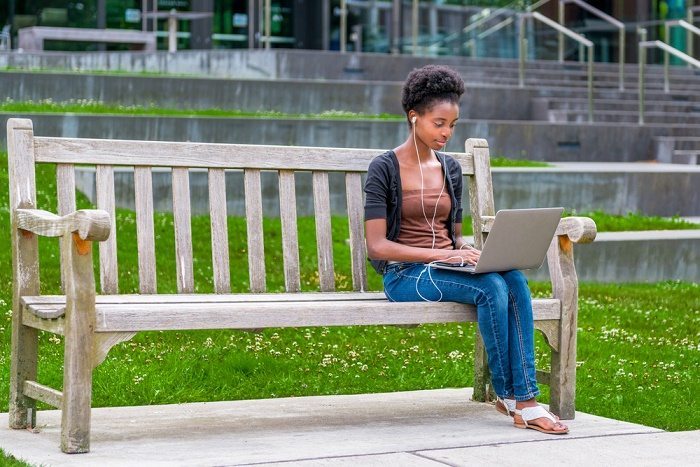#BlackGirlsMatter: Twitter Town Hall Responds to Spring Valley High School Assault
On Tuesday afternoon, Twitter was buzzing in a National Day of Action against the October 26 attack, as a town hall drew hundreds of participants sharing their own stories with the hashtags #FundBlackFutures and #BlackGirlsMatter.

When footage of a white sheriff’s deputy savagely yanking a Black teenage girl out of her seat and slamming her onto the floor of her classroom went viral last week, Twitter lit up with reactions to the #AssaultAtSpringValleyHigh.
The video of Deputy Ben Fields from Richland County, South Carolina, was shared hundreds of times, with many accounts condemning his use of brute force against the young girl, who he first puts in a chokehold before throwing her across the room and then violently handcuffing her.
On Tuesday afternoon, Twitter was buzzing in a National Day of Action against the October 26 attack, as a town hall hosted by Black Youth Project 100 (BYP 100) drew hundreds of participants sharing their own stories with the hashtags #FundBlackFutures and #BlackGirlsMatter.
I laugh now about my suspensions and detentions and hiding from school police but that’s to keep from crying. It’s trauma. #FundBlackFutures
— Domo (@hazzardeuce) November 3, 2015
I was often told by elders to “keep [my] head down”, not to make trouble so I could get through. Policed into submission #FundBlackFutures — Asha (@suitlalumiere) November 3, 2015
The African American Policy Forum (AAPF), which co-hosted the town hall and held a webinar on Black girls and discipline earlier in the day, posted an infographic showing how Black girls are six times more likely to be suspended than white girls, tweeting: “#SpringValleyHigh is everywhere.”
Black Girls are 6X as likely to be suspended as white girls. #SpringValleyHigh is everywhere. #FundBlackFutures pic.twitter.com/4yzpCSNQyw — AAPF (@AAPolicyForum) November 3, 2015
While activists and even policymakers frequently reference the disproportionate impacts of mass incarceration and the school-to-prison pipeline on Black and men and boys, far less is said about how these same systems discriminate against Black girls. According to a 2015 report by AAPF and the Center for Intersectionality and Social Policy Studies (CISPS) entitled Black Girls Matter: Pushed Out, Overpoliced and Underprotected, existing research on racially biased punitive practices in schools and elsewhere actually excludes girls from the analysis altogether, “leaving stakeholders to infer that girls of color are not also at risk.”
But as scores of participants in yesterday’s town hall pointed out, and what the report also makes clear, the opposite is true. Black girls are now receiving more severe sentences upon entering the juvenile justice system than any of their peer groups. They are also the fastest growing population in the system.
Based on focus group interviews with girls in Boston and New York City over a period of one year, the report revealed Black girls are frequently suspended, expelled, or even arrested for “fighting” or other minor infractions without recourse to counseling or less draconian measures. Increased levels of law enforcement personnel in schools have also contributed to feelings of extreme vulnerability, prompting many girls to skip school altogether rather than confront hostile, often violent, authorities.
The AAPF and CISPS report offers stunning anecdotal evidence of the systematic discrimination of Black girls, including an incident in which a 12-year-old from an Orlando private school was threatened with expulsion “if she didn’t change the look of her natural hair.” In another situation, a teacher in an Alabama classroom hit a 16-year-old girl with a book for falling asleep in class. The student suffered from diabetes, asthma, and sleep apnea.
Samantha Master, who participated in the AAPF webinar, told Rewire in a phone interview that a convergence of socioeconomic and political forces, such as the trauma of being pushed out of their homes by gentrification, or living in food deserts where their guardians might be working 16-hour days at low-wage jobs, often create the conditions under which Black girls are seen as “acting out.”
“Imagine then going to school and confronting stereotypes of who we are, how we operate … and the emotional toll on the bodies and psyches of Black girls as a result of hyper-policing,” Master said.
Master, an African American leadership and engagement specialist at Planned Parenthood Federation of America, noted that Black girls are sexualized at a far higher rate than their white counterparts, and frequently forced into spaces that reinforce the idea “that our bodies are not our own.”
“The ways in which we don’t have access to reproductive health services or comprehensive sex education and are constantly taught that we are sexually deviant—these manifest in physical outcomes like higher rates of depression, suicide, mental illness, even higher blood pressure,” she added.
Participants in the Twitter town hall also said that LGBTQ or gender-nonconforming teens of color are subject to additional punitive treatment, or find themselves more vulnerable to harsh disciplinary measures. One Twitter user wrote:
My visible queerness (walking w my gf to class) made me a target for additional scrutiny about tardiness #FundBlackFutures — Asha (@suitlalumiere) November 3, 2015
In response to a question on what schools would look like if they were safe places for all Black youth, AAPF’s Kimberlé Crenshaw tweeted:
A7: Schools would be places where Black girls could be carefree and express their magic without fear of punishment #FundBlackFutures — Kimberle Crenshaw (@sandylocks) November 3, 2015
